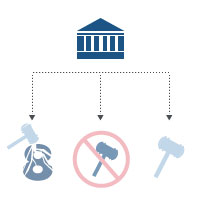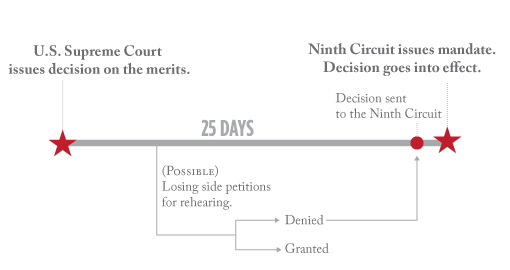Marriage News Blog

The Supreme Court is expected to rule by the end June on whether Proposition 8, CaliforniaŌĆÖs ban on marriage for gay and lesbian couples, violates the Due Process and Equal Protection Clauses of the Fourteenth Amendment to the United States Constitution. HereŌĆÖs what could happen:
Overview
In May 2009, AFER was founded to sponsor the federal constitutional challenge to CaliforniaŌĆÖs Proposition 8, an amendment to the California Constitution that eliminated the fundamental right of gay and lesbian couples to marry in the state. Two couples, Kris Perry & Sandy Stier and Paul Katami & Jeff Zarrillo, are represented in court by distinguished bipartisan attorneys Ted Olson and David Boies, who notably faced-off in Bush v. Gore. After a historic trial, on August 4, 2010┬Āthe Federal District Court ruled that Prop. 8 is unconstitutional. That landmark ruling was then affirmed by the Ninth Circuit Court of Appeals on February 7, 2012. The U.S. Supreme Court heard oral argument in AFER’s case on March 26, 2013.
Timing of the Decision
The Court will issue a decision on Wednesday, June 26 beginning at 10 a.m. ET/ 7 a.m. PT.
How Might the Court Rule?
The Court has several options to choose from when deciding the Prop. 8 case.┬Ā HereŌĆÖs how the Justices could rule:
- Fifty-State Ruling: Prop. 8 and all other state marriage bans are unconstitutional. Gay and lesbian couples will be able to get married in all fifty states.
- Seven-State Ruling: Civil unions and domestic partnerships are separate and unequal. Gay and lesbian couples will be able to get married in California and the six other states with relationship recognition, in addition to the twelve states currently with marriage equality.
- One-State Ruling: California cannot eliminate marriage equality. Gay and lesbian couples will once again be able to get married in the state.
- No Standing: The Court could conclude that it does not have jurisdiction to decide the case because the Proponents of Prop. 8 do not have standing to appeal the lower court rulings that invalidated Prop. 8. The Governor and Attorney General of California agree with AFER that Prop. 8 is unconstitutional and have refused to defend it or appeal the lower court rulings.┬Ā If the Court concluded that Proponents lack standing, the August 2010 decision of the Federal District Court that struck down Prop. 8 is made permanent, and marriage equality will be restored in California.
- Dismissal: The Court could decide that it should not have granted review. ┬Ā A decision to dismiss review is known as a ŌĆ£DIG,ŌĆØ which stands for dismissing certiorari as improvidently granted. ┬ĀIf this happens, the February 2012 decision of the Ninth Circuit Court of Appeals that struck down Prop. 8 is made permanent, ending four years of marriage inequality in California.
- Prop. 8 is constitutional:┬ĀStates may exclude gay and lesbian couples from the institution of marriage.
When Could Weddings Start?
If the Supreme Court rules that Prop. 8 is unconstitutional, marriages could begin as soon as the CourtŌĆÖs decision becomes final.┬Ā Once this happens, the Clerk of the Court will send an order to the clerk of the Ninth Circuit, and that court will issue its mandate shortly thereafter.
If the Court rules that Prop. 8 is unconstitutional (scenarios 1-3), the Proponents will have 25 days to petition for rehearing after the decision is handed down. If they do not do so, the CourtŌĆÖs decision will become final. If they do, the CourtŌĆÖs decision will be stayed while the Justices consider the petition.

If the Court concludes that it lacks jurisdiction (scenario 4), ┬Āmarriage equality┬Āwill begin in California as soon as the District CourtŌĆÖs judgment takes effect.┬ĀIf the Court concludes that it should not have granted review (scenario 5), marriage equality will begin in California as soon as the Ninth Circuit issues its mandate.

